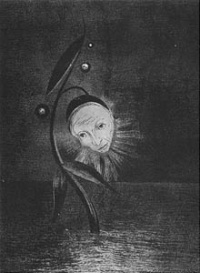In tristitia hilaris, in hilaritate tristis
From The Art and Popular Culture Encyclopedia
(Difference between revisions)
| Revision as of 19:29, 26 January 2016 Jahsonic (Talk | contribs) ← Previous diff |
Current revision Jahsonic (Talk | contribs) |
||
| Line 1: | Line 1: | ||
| - | {{Template}} | + | [[Image:La Fleur du marécage by Redon.jpg|thumb|200px|right| |
| - | "[[In tristitia hilaris, in hilaritate tristis]]" is a dictum by [[Giordano Bruno]], recorded in ''[[Il Candelaio]]''. | + | [[Pierrot]] is a [[stock character]] of the [[sad]] [[clown]]. |
| + | <br>Illustration: ''[[La Fleur du marécage]]'' (1885) by Odilon Redon]]{{Template}} | ||
| + | "[[In tristitia hilaris, in hilaritate tristis]]" is a dictum by [[Giordano Bruno]], recorded in ''[[Il Candelaio]]'' and elsewhere. It translates as "in sadness be joyful, in joy be sad" or as “Cheerful in [[gloom]], gloomy in cheer”. | ||
| - | It is often said to be Giordano Bruno's [[motto]]. It translates as "in sadness be joyful, in joy be sad". It is usually cited as the source for ''[[Finnegans Wake]]'' 's characters "Tristopher and Hilary". | + | It is often held to be Giordano Bruno's [[motto]]. |
| + | |||
| + | It is usually cited as the source for ''[[Finnegans Wake]]'' 's characters "Tristopher and Hilary". | ||
| ==See also== | ==See also== | ||
| *[[Cognitive dissonance]] | *[[Cognitive dissonance]] | ||
| *[[Ambiguity]] | *[[Ambiguity]] | ||
| - | *[[The tears of a clown]] | + | *[[Sad clown]] |
| *[[Laughter]] | *[[Laughter]] | ||
| *[[Sadness]] | *[[Sadness]] | ||
| + | *[[Oxymoron]] | ||
| + | *[[Tragic hero]] | ||
| {{GFDL}} | {{GFDL}} | ||
| [[Category:Dicta]] | [[Category:Dicta]] | ||
Current revision

Pierrot is a stock character of the sad clown.
Illustration: La Fleur du marécage (1885) by Odilon Redon
Illustration: La Fleur du marécage (1885) by Odilon Redon
|
Related e |
|
Featured: |
"In tristitia hilaris, in hilaritate tristis" is a dictum by Giordano Bruno, recorded in Il Candelaio and elsewhere. It translates as "in sadness be joyful, in joy be sad" or as “Cheerful in gloom, gloomy in cheer”.
It is often held to be Giordano Bruno's motto.
It is usually cited as the source for Finnegans Wake 's characters "Tristopher and Hilary".
[edit]
See also
Unless indicated otherwise, the text in this article is either based on Wikipedia article "In tristitia hilaris, in hilaritate tristis" or another language Wikipedia page thereof used under the terms of the GNU Free Documentation License; or on research by Jahsonic and friends. See Art and Popular Culture's copyright notice.

